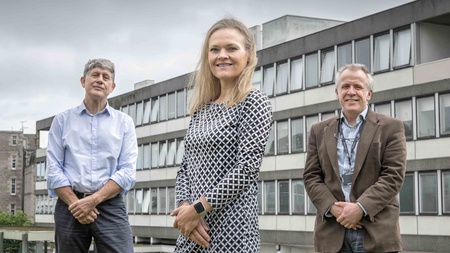A University of Aberdeen study that aims to identify crucial biological 'warning signs' of an aspect of Covid-19 is to be supported by almost £100,000 from NHS Grampian Endowments.
Dr Nicola Mutch and her team will look for defining key ‘biomarkers’ of a specific aspect of Covid-19.
Up to one third of patients hospitalised for Covid-19 develop a severe form of lung disease that can be fatal.
It is known that part of the problem is that the air space in the lung is consumed by a build-up of deposits of a protein called fibrin.
These fibrin deposits restrict the amount of oxygen being absorbed into the lung and patients with severe disease require oxygen support, which in very severe cases requires mechanical ventilation.
Dr Mutch and her team will attempt to find out why excessive fibrin forms in the lungs of Covid-19 infected patients.
The study will also explore whether specific ‘biomarkers’ of fibrin formation and its breakdown can be used to identify patients at risk of developing more severe disease.
Dr Nicola Mutch said: “Blood clots, which are jelly-like masses of cells and a protein called fibrin are observed in around 30% of patients with COVID-19. We do not yet understand why these patients are so prone to the development of these clots in big and small blood vessels throughout the body.
“Defining key ‘biomarkers’ associated with blood clot formation and persistence in patients will allow us to identify early those at risk of severe outcomes and help guide medical treatment.
“We are hugely grateful to NHS Endowment Fund for supporting this important study.”
Professor Henry Watson, Consultant in Haematology at Aberdeen Royal Infirmary added: “We recognised early on in the outbreak that the feature that was common to many of the patients who had more severe outcomes of Covid-19 infection was that they were all from groups of patients with a reason for having poor function of the cells that line blood vessels which are called endothelial cells.
“Dr Mutch’s lab have expertise in measuring many of the functions of blood cells, proteins and substances produced by endothelial cells and so we decided that we should look at these in relation to the severity of Covid-19 infection in a large group of patients to give us more insight to the mechanisms of disease and so offer options on how to manage patients.”
Luan Grugeon, Chair of Trustees of NHS Grampian Endowment Fund said: “Our Trustees agreed at the start of the pandemic to support research into COVID-19 and are delighted to award research funding of £96,652 towards the University of Aberdeen’s Covid-19 ‘warning signs’ study project.


